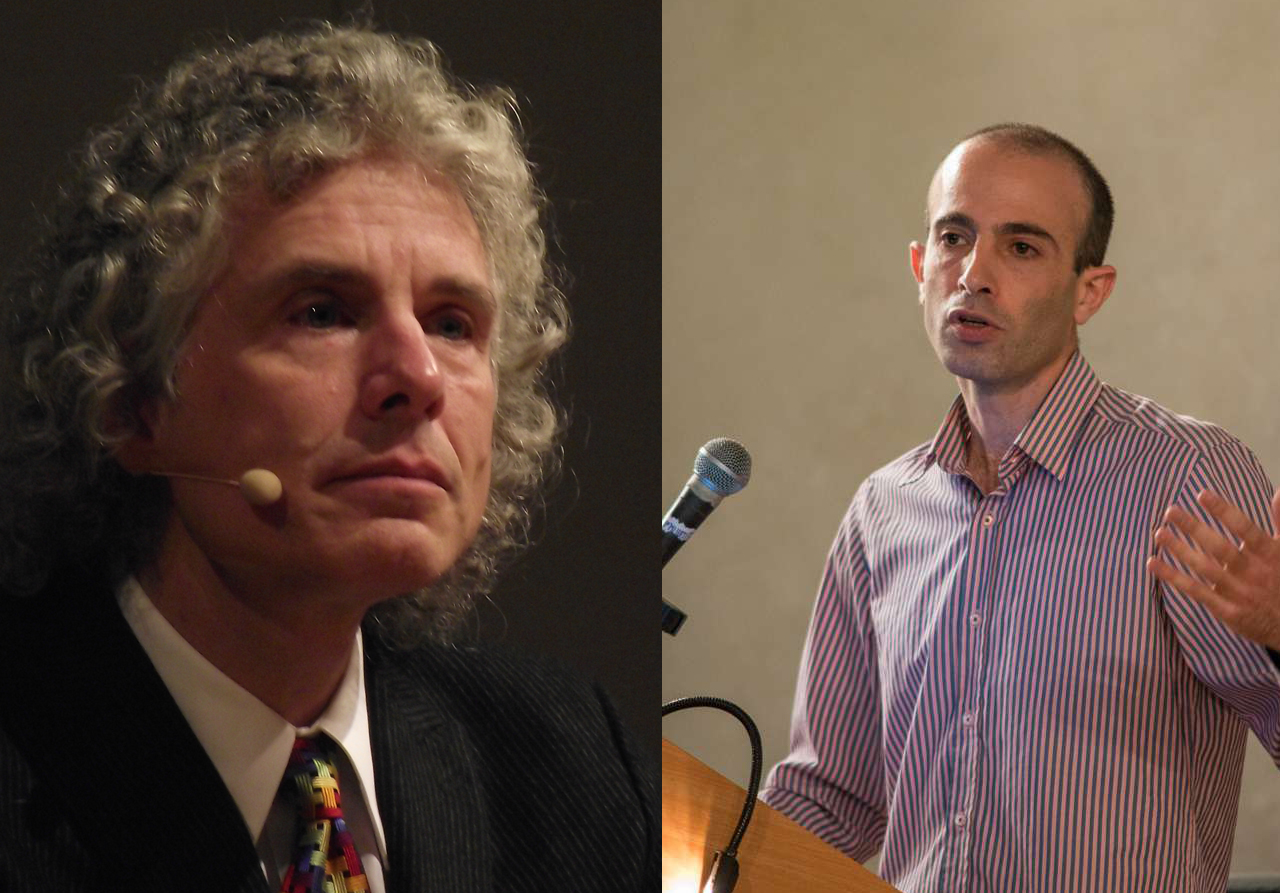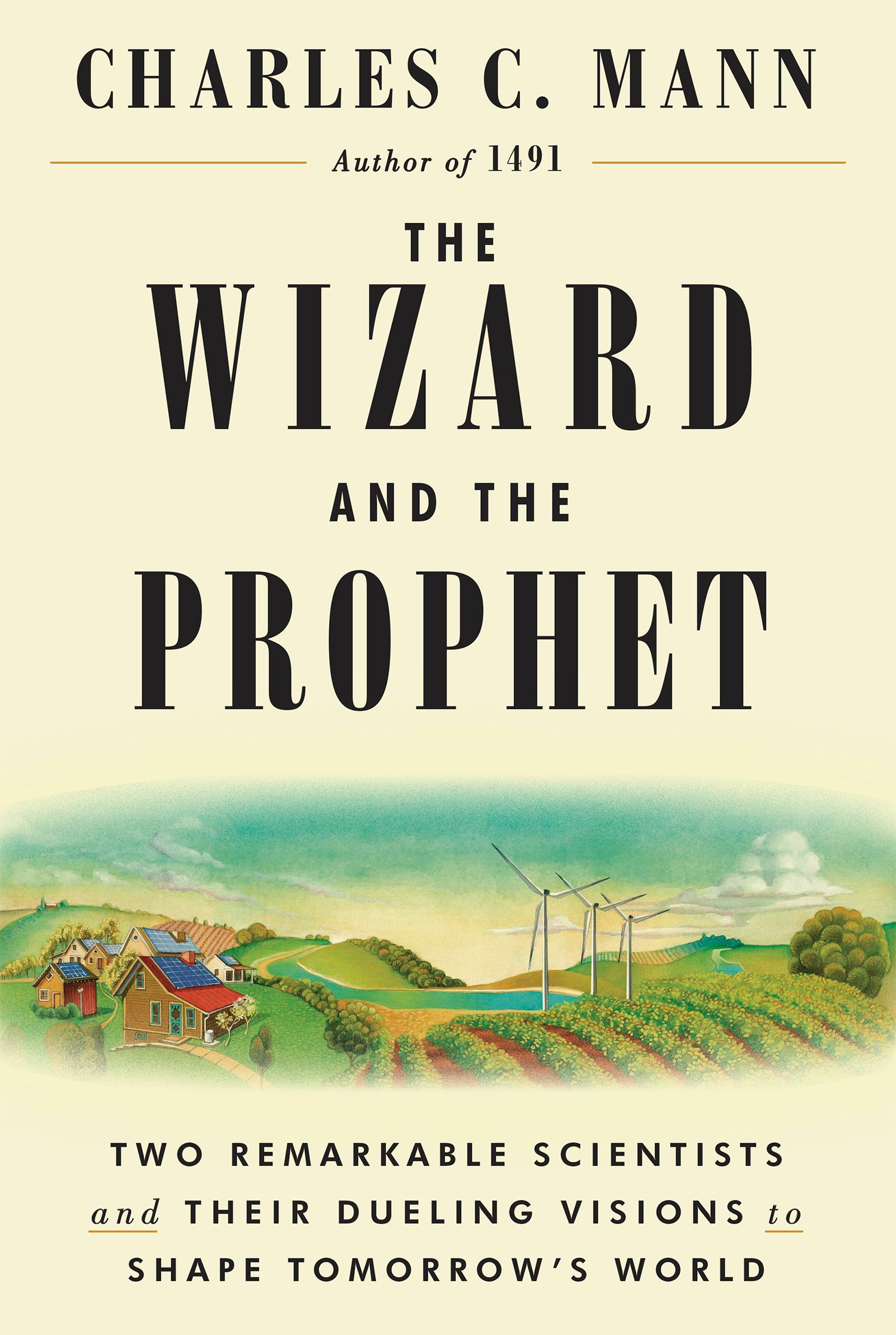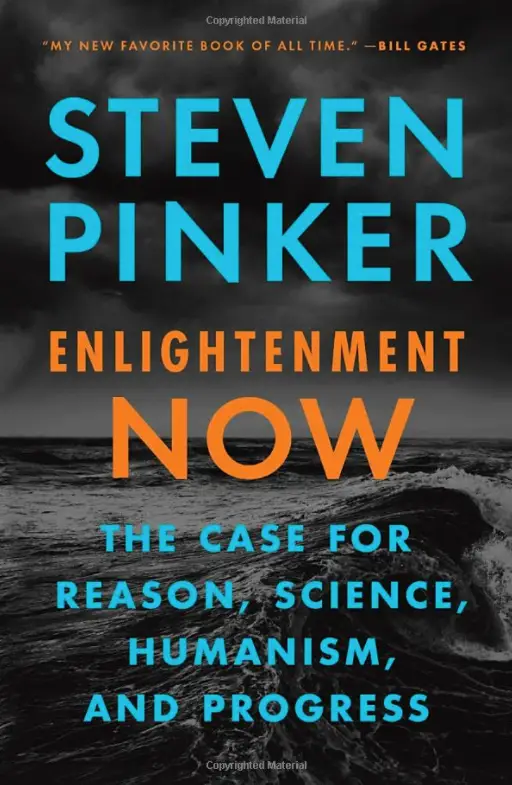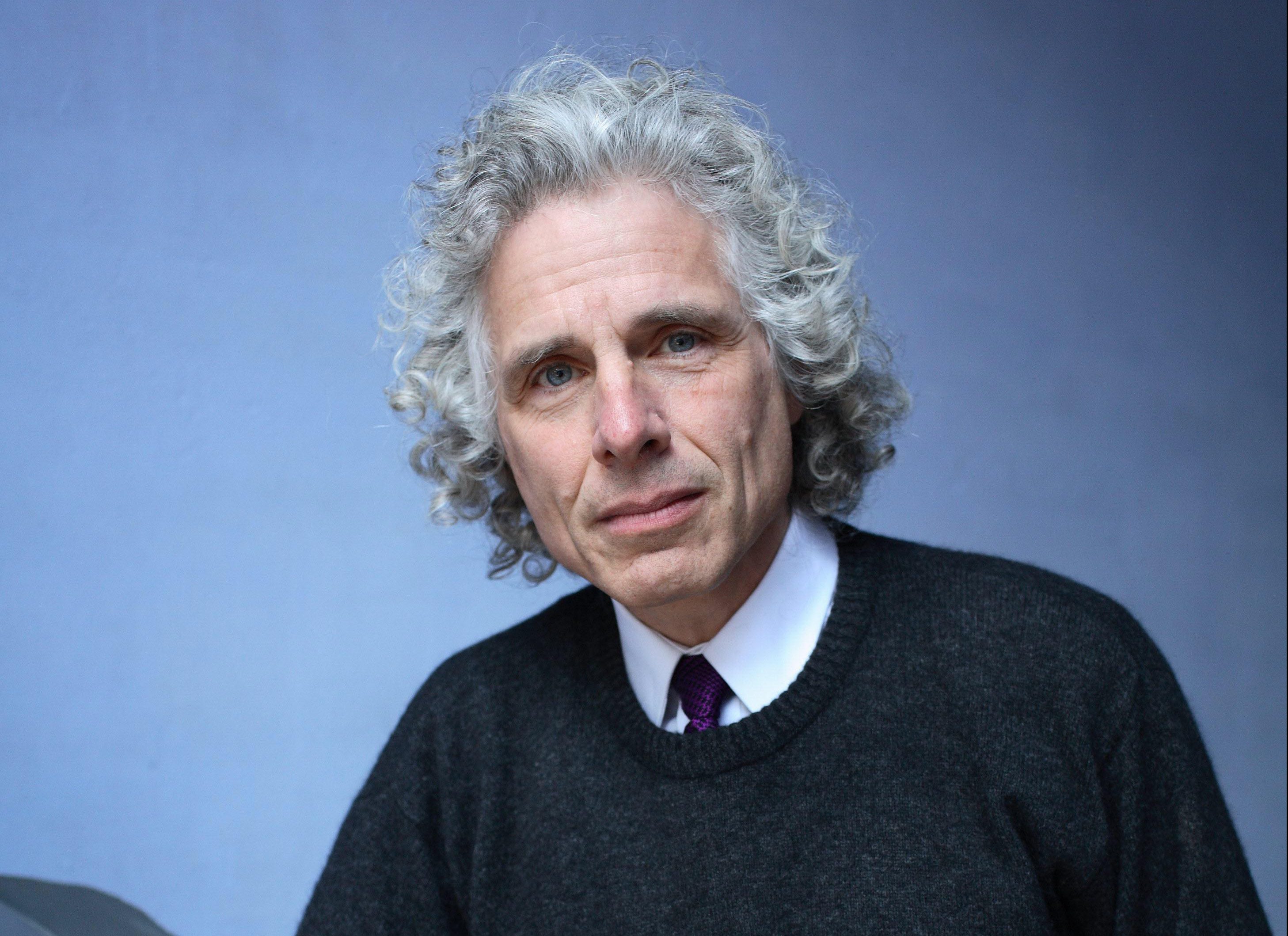Top Stories
The Wizard and the Prophet: On Steven Pinker and Yuval Noah Harari
Pinker reminds us of what we in the chattering classes too often forget: namely, that modernity has for the most part been a major upgrade for humanity.


In The Wizard and the Prophet (2018), Charles C. Mann maintains that intellectual life in the 21st century is defined by a civil war between Wizards, who believe that technology will save us, and Prophets, who see various kinds of disaster on the horizon: “Prophets look at the world as finite, and people as constrained by their environment. Wizards see possibilities as inexhaustible, and humans as wily managers of the planet. One views growth and development as the lot and blessing of our species; others regard stability and preservation as our future and our goal. Wizards regard Earth as a toolbox, its contents freely available for use; Prophets think of the natural world as embodying an overarching order that should not casually be disturbed.” Steven Pinker, the author of Enlightenment Now: The Case for Reason, Science, Humanism, and Progress (2018), is a Wizard. Yuval Noah Harari, the author of Homo Deus: A Brief History of Tomorrow (2015), is a Prophet.
At its best, Enlightenment Now reads like one of those gratitude journals self-help authors tell us to keep: “Today I am thankful for . . . .” Pinker reminds us of what we in the chattering classes too often forget: namely, that modernity has for the most part been a major upgrade for humanity: “The story of human progress is truly heroic. It is glorious . . . We live longer, suffer less, learn more, get smarter, and enjoy more small pleasures and rich experiences. Fewer of us are killed, assaulted, enslaved, oppressed, or exploited by the others. From a few oases, the territories with peace and prosperity are growing, and could someday encompass the globe.”
Like most Wizards, Pinker thinks that our ancestors were for the most part benighted idiots: “an average person of 1910, if he or she had entered a time machine and materialized today, would be borderline retarded by our standards, while if Joe and Jane Average made the reverse journey, they would outsmart 98 percent of the befrocked and bewhiskered Edwardians who greeted them as they emerged.”
Like most Prophets, Harari assumes that our ancestors were in certain respects better than us: “Twenty thousand years ago, the average Sapiens probably had higher intelligence and better toolmaking skills than the average Sapiens of today. Modern schools and employers may test our aptitudes from time to time but, no matter how badly we do, the welfare state always guarantees our basic needs. In the Stone Age natural selection tested you every single moment of every single day, and if you flunked any of its numerous tests you were pushing up the daisies in no time.”

For all of the most obvious reasons, religious people are going to hate Enlightenment Now. But political people won’t like it much either. Pinker has harsh words for ideologues of all stripes (e.g., progressives, conservatives, communists, socialists, and the alt-right). Although Pinker seems most partial, on balance, to libertarianism, he’s nevertheless quite critical of doctrinaire libertarians: “tellingly, the number of libertarian paradises in the world—developed countries without substantial social spending—is zero. . . . a free market can coexist with regulations on safety, labor, and the environment, just as a free country can coexist with criminal laws. And a free market can coexist with high levels of spending on health, education, and welfare . . . indeed, some of the countries with the greatest amount of social spending also have the greatest amount of economic freedom.”
Pinker’s criticism of Piketty-loving, Occupy-Wall-Street types who prate on and on about inequality is equally harsh: “Among the world’s billionaires is J. K. Rowling, author of the Harry Potter novels, which have sold more than 400 million copies and have been adapted into a series of films seen by a similar number of people. Suppose that a billion people have handed over $10 each for the pleasure of a Harry Potter paperback or movie ticket, with a tenth of the proceeds going to Rowling. She has become a billionaire, increasing inequality, but she has made people better off, not worse off . . . . Her wealth arose as a by-product of the voluntary decisions of billions of book buyers and moviegoers.”
With a sly smile, Joseph Campbell once defined “mythology” as “other people’s religion.” Thinking along similar lines, Harari maintains that we should be careful not to drink the Enlightenment Kool-Aid. Humanism didn’t heroically replace religion with rationality; it heroically replaced an old religion with a new one. Humanism is, for Harari, just another religion: “The humanist religion worships humanity, and expects humanity to play the part that God played in Christianity and Islam. . . . Humanism shared the fate of every successful religion, such as Christianity and Buddhism. As it spread and evolved, it fragmented into several conflicting sects.” The three main branches of humanism are: (1) liberal humanism, the orthodox branch, which believes that “the voter knows best”, “beauty is in the eye of the beholder”, and “the customer is always right”; (2) socialist humanism, “which encompassed a plethora of socialist and communist movements”; and (3) evolutionary humanism, “whose most famous advocates were the Nazis.”

“Initially,” avers Harari, “the differences between liberal humanism, socialist humanism and evolutionary humanism seemed rather frivolous. Set against the enormous gap separating all humanist sects from Christianity, Islam or Hinduism, the arguments between different versions of humanism were trifling. As long as we all agree that God is dead and that only the human experience gives meaning to the universe, does it really matter whether we think that all human experiences are equal or that some are superior to others? Yet as humanism conquered the world, these internal schisms widened, and eventually flared up into the deadliest war of religion in history.” Just as the 16th and 17th centuries were defined by the Wars of Religion between different sects of Christianity, Harari argues that the 20th century was defined by the Humanist Wars of Religion between different sects of Humanism.

The smart money wasn’t on liberal humanism. As Harari makes clear, for most of the 20th century, the best and brightest believed that liberal democracy’s days were numbered. And yet, against all odds, it prevailed against its rivals:
In the early twenty-first century, this is the only show in town. . . . As of 2016, there is no serious alternative to the liberal package of individualism, human rights, democracy and a free market. The social protests that swept the Western world in 2011—such as Occupy Wall Street and the Spanish 15-M movement—have absolutely nothing against democracy, individualism and human rights, or even against the basic principles of free-market economics. Just the opposite: they take governments to task for not living up to these liberal ideals. They demand that the market be really free, instead of being controlled and manipulated by corporations and banks ‘too big to fail’. They call for truly representative democratic institutions, which will serve the interests of ordinary citizens rather than of moneyed lobbyists and powerful interest groups. Even those blasting stock exchanges and parliaments with the harshest criticism don’t have a viable alternative model for running the world. While it is a favorite pastime of Western academics and activists to find fault with the liberal package, they have so far failed to come up with anything better.
Liberal humanism has had a good run. But Harari suggests that the party may soon be over. Will liberal humanism be taken down by reactionaries like Putin and Trump? Nope. Like Pinker, Harari believes that the forces of reaction have no future. These are geriatric movements that appeal primarily to the elderly. Young people, regardless of their politics, have overwhelmingly rejected the world these grumpy old men wish to return to. All of this reactionary ranting and raving is little more than the bellowing of a dying beast.
Will liberal humanism be taken down by religion? Nope. Like Pinker, Harari maintains that religion has no future: “More than a century after Nietzsche pronounced Him dead, God seems to be making a comeback. But this is a mirage. God is dead—it just takes a while to get rid of the body. Radical Islam poses no serious threat to the liberal package, because for all their fervor, the zealots don’t really understand the world of the twenty-first century, and have nothing relevant to say about the novel dangers and opportunities that new technologies are generating all around us.”
If Harari is to be believed, liberal humanism is going to be undermined in a decade or two by the very same scientific progress that Pinker extols at length in Enlightenment Now. Just as scientific study of the Bible inadvertently undermined faith in the Christian God, scientific study of the mind is inadvertently undermining faith in the liberal humanist God: the freely-choosing individual. The algorithms used by Facebook and Google already know you better than your friends and family do. But the algorithms of the future will know you better than you know yourself.
Harari inadvertently predicted our response to the Cambridge Analytica Scandal three years ago in Homo Deus. He said that exposés of the burgeoning algorithm industry would probably be rejected for the same reason that exposés of the public relations industry are habitually rejected: namely, because we don’t want to believe that we’re so easily manipulated. Like all liberal humanists, we place our faith in the freely-choosing individual. As such, exposés such as this one are an existential threat. Alas, I now suspect that my own view of Hillary Clinton was shaped to some extent by these manipulations. I also suspect that some of my Facebook friends were inadvertently getting their “facts” from fake accounts set up by troll farms in St. Petersburg. Human nature being what it is, I imagine that most of them will double-down now. Because it’s hard to admit that you were duped, and that you’re not as smart as you think you are.
Whoever controls these algorithms will wield a truly godly power. They’ll be able to influence or even decide elections without stuffing the ballot box, gerrymandering the district, or rigging the election. And they’ll be able to get you to buy things you don’t need in ways that’ll make the Don Drapers of the advertising world green with envy. In short, they will be able to manipulate you in ways that Orwell could scarcely imagine. Paranoid media studies gurus like Chomsky have been telling us how consent is manufactured for decades. But what will become of our democratic faith in the wisdom of the electorate when the algorithms of the future prove them right? Harari seems haunted by questions of this kind.
Filmmakers were still allowed to depict adulterers, criminals, and femme fatales in Hays-Era Hollywood, so long as the bad people were eventually brought to justice or otherwise punished for their sins. In the same way, although it’s somewhat frowned upon, right-thinking intellectuals in the 21st-century West are still allowed to say some nice things about progress, technology, modernity, science, and capitalism, so long as they make it clear that a great reckoning is on the horizon, and we shall all pay dearly for our hubris. How else to explain the wildly divergent receptions of Harari’s Homo Deus and Pinker’s Enlightenment Now?
In the lengthy first chapter of Homo Deus, Harari recounts the very same progress narrative that reviewers love to hate in Pinker’s new book; and yet, to the best of my knowledge, nobody dismissed Harari as a simpleminded apologist, or a Panglossian proponent of scientism. On the contrary, the chattering classes produced a veritable deluge of fawning reviews of Harari’s book. What explains the difference? I think it is this: Pinker is a Wizard who doesn’t make the bad girl pay for her sins at the end of his story. He dares to suggest that she might find happiness and live happily ever after. My God! It’s high school all over again. The happy and healthy jocks who listen to pop music and smile too much must be shallow, whilst the moody kids in the corner listening to The Smiths and moping must be the bearers of profound insight.
If Pinker and Harari debated each other, I’ve no doubt that Pinker would win. Because Harari argues like a self-doubting intellectual, whilst Pinker argues like a ruthless debate club president. His certainty is at times annoying, as is his preachy style. You want an argument but feel like you’re getting a sermon. I doubt that he’s actually an ideologue (in real life); but he sure does write like one. Be that as it may, I suspect that these men agree on most matters and want the same things of the future. If Pinker paints a rosy picture of human progress and its achievements in the hope that both will continue, Harari sketches a dystopian future in the hopes that doing so will prevent it. Like all prophets, he prophesies to prevent the prophecy, not to predict it.






